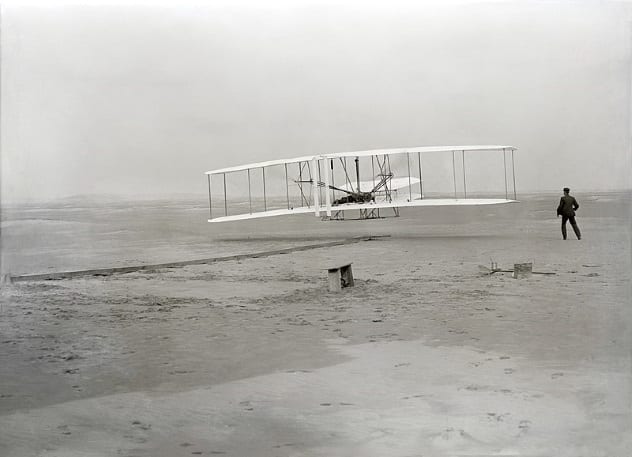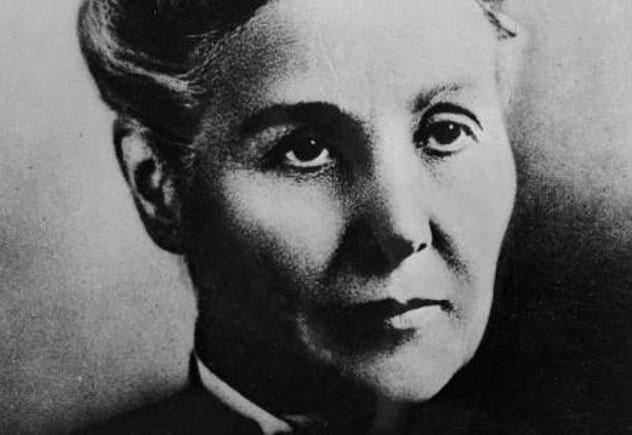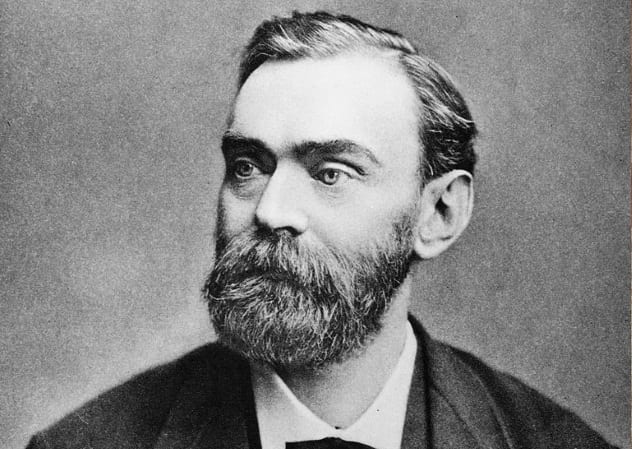 Movies and TV
Movies and TV  Movies and TV
Movies and TV  Humans
Humans 10 Times Scientists Were Absolutely Sure… and Absolutely Wrong
 Our World
Our World 10 Pivotal Moments for Life on Earth
 Movies and TV
Movies and TV 10 Most Realistic Medical TV Shows of All Time
 Creepy
Creepy 10 Eerie & Mysterious Ghosts of the Pacific Coast
 Weird Stuff
Weird Stuff 10 Typos That Accidentally Changed History
 History
History 10 Times Trickery Won Battles
 Technology
Technology 10 Awesome Upgrades to Common Household Items
 Misconceptions
Misconceptions 10 Hilarious (and Totally Wrong) Misconceptions About Childbirth
 Weird Stuff
Weird Stuff 10 Warning Labels That Exist Because Someone Actually Tried It
 Movies and TV
Movies and TV 10 Zombie Movies That Will Actually Terrify You
 Humans
Humans 10 Times Scientists Were Absolutely Sure… and Absolutely Wrong
 Our World
Our World 10 Pivotal Moments for Life on Earth
Who's Behind Listverse?

Jamie Frater
Head Editor
Jamie founded Listverse due to an insatiable desire to share fascinating, obscure, and bizarre facts. He has been a guest speaker on numerous national radio and television stations and is a five time published author.
More About Us Movies and TV
Movies and TV 10 Most Realistic Medical TV Shows of All Time
 Creepy
Creepy 10 Eerie & Mysterious Ghosts of the Pacific Coast
 Weird Stuff
Weird Stuff 10 Typos That Accidentally Changed History
 History
History 10 Times Trickery Won Battles
 Technology
Technology 10 Awesome Upgrades to Common Household Items
 Misconceptions
Misconceptions 10 Hilarious (and Totally Wrong) Misconceptions About Childbirth
 Weird Stuff
Weird Stuff 10 Warning Labels That Exist Because Someone Actually Tried It
10 Inventions That People Really Regretted Inventing
Being an inventor has always seemed to be a pretty awesome career choice; if you’re good at, it you’re virtually guaranteed acclaim and a place in history. People who dream up the inventions that become part of our everyday lives are also allowed to be eccentric in ways that would get the average Joe fired from his office job.
It’s not always such a great deal to be an inventor, though, especially if you come up with something that you later wish you’d never thought of. Here are ten inventions that were a cause of doubt for their inventors.
10 The Atomic Bomb

We can understand how the inventor of a bomb that caused massive death and destruction might wish he had kept his idea to himself, and that is exactly how J. Robert Oppenheimer felt in later years. He was a member of the team that is credited with developing nuclear weapons as part of the Manhattan Project. Oppenheimer was a major part of this, as he was there at the very start of it in 1942 and was widely regarded as its leader—even being given the name “father of the atomic bomb” in the decades since. His personal political views were leftist, but he agreed to take part in the project because he shared the view of other scientists—including Leo Szilard and Albert Einstein—that it was vital for the US to develop an atomic bomb before the Nazis did.
He remained enthusiastic in May 1945, when he spoke at a meeting about the “brilliant luminescence” that the bomb would produce.[1] It was when he actually witnessed the first atomic bomb explosion in July 1945 that he started to have doubts about what he had helped to create, responding to the sight of it with a piece of Hindu scripture: “I am become death, the destroyer of worlds.” In October 1945, after he had left his work with the Manhattan Project, Oppenheimer told President Truman that he believed he had blood on his hands as a result of it.
9 The Airplane

Everyone knows about the Wright brothers inventing the first successful airplane, but what is less well-documented is the regret that one of them—Orville Wright—felt about it in later years. Orville and his brother Wilbur designed and built the Wright Flyer, which was the very first heavier-than-air, powered craft to achieve sustained flight on December 17, 1903. Their interest in aeronautics was sparked by a model helicopter that was bought for them by their father when they were children, and after German inventor Otto Lilienthal was killed when his glider crashed, they decided to pick up where he had left off. This ultimately brought them fame, success, and a spot in the history books, although Wilbur would die from typhoid fever just nine years after their 1903 triumph.
Maybe he had the happier fate, though, because Orville lived long enough to witness the development of airplanes over the next three decades, culminating in their being used to carry and drop bombs during World War II. He had seen the airplane as something that would help to bring about peace, rather than as a weapon of war. We know from an interview that he gave to the St. Louis Post-Dispatch in 1943 that the war left him feeling very conflicted about his invention: proud of the potential good it could do but bitter at the way it was being used for destruction and death instead.[2]
8 Facebook

Mark Zuckerberg has never expressed any regrets about the creation of Facebook, possibly because the people who built him forgot to program regret into his database, but others involved in its development have. One person who was part of the Facebook team in its earliest days and who has since voiced doubts about it is Sean Parker. Parker worked on Facebook from the period when it was still just a directory available only to students at Harvard University, and Zuckerberg has cited him as being key to it moving beyond that to the global social media platform it is now. Parker managed to bring in wealthy investors like Peter Thiel and, in turn, became a billionaire himself thanks to his stake in Facebook.
However, in 2017, he stated that the site achieved its popularity because it took advantage of “vulnerability in human psychology” through the “Like” function, which validates people for their opinions, jokes, photographs, and other things they post on the site. It would be hard to argue with his assessment of how and why the platform has become so addictive to so many, but Parker also stated that this was not accidental but rather something that the founders of Facebook consciously set out to achieve. He went on to add that he is now a social media skeptic after witnessing it consume much of the world.[3]
7 Pop-Up Ads

We all regret the invention of pop-up advertisements, including the man who created them—one Ethan Zuckerman. He came up with this horrible idea during the 1990s, when he was employed by Tripod.com as programmer and designer, and the site was faced with a major car company upset that it had paid for a banner advertisement that appeared on a sexually explicit webpage. Tripod devised the idea of ads that would not actually be on the original page itself but would “pop up” on a separate one so that companies could avoid unwanted association with NSFW content, and Zuckerman wrote the actual code for it.[4]
In 2014, he penned an article for The Atlantic that amounted to an apology for the way that this had been adopted as a mainstream strategy for companies advertising online—causing untold irritation to millions of Internet users in the process—and said that the original intent behind it was good. He also argued that a way of getting rid of ads on the Internet would be for users to pay for online services, with a guarantee of privacy protection in return. We might feel like the apology is too little, too late, but at least it didn’t pop up randomly in the middle of a video.
6 Mother’s Day

Anyone who has ever forgotten to buy a card and a gift for Mother’s Day has regretted the day it was invented, but not quite as much as the person who actually came up with it. The US version of the day was created by Anna Jarvis in 1908 and was inspired by her own mother, who had come up with a “Mother’s Friendship Day” in order to promote reconciliation after the Civil War. Jarvis’s idea quickly grew in popularity and spread to virtually all US states within five years of its creation, before becoming an official national holiday in 1914.
We might expect that Jarvis would have been delighted by the widespread enthusiasm toward her idea, but that could not have been further from the truth. Although she was pleased that it had become a nationally recognized event, she quickly came to realize that this meant commercial exploitation, and by as early as 1920, she had turned against the holiday and was publicly asking people not to buy the gifts or cards in stores.[5]
The three remaining decades of Jarvis’s life became a long and losing battle against this that saw her take companies and individuals that used the name of the holiday without her authorization to court and ended with her losing all of her money. At the time of her death in 1948, she was living alone and penniless in a sanatorium, having been destroyed by the dream she had worked so hard to make reality.
5 Dynamite

The inventor of dynamite was Alfred Nobel, but it is probably not what he would have wanted to be remembered for. He was born in Stockholm in 1833 and inherited an interest in explosives from his father, who was also an inventor. Alfred was sent abroad by his father, and while he was in Paris, he came into contact with Ascanio Sobrero, a chemist from Italy who had developed nitroglycerine. Nobel became fascinated by this highly explosive substance but recognized that a way to stabilize it would need to be found if it were to be of practical use. He achieved this by blending it with the clay kieselguhr, which produced a paste-like substance that he called dynamite and took out a patent on in 1867.
This invention guaranteed Nobel a place in history, although he had intended it to be used in the mining industry rather than for warfare, and he told friends such as Bertha Von Suttner that he hoped the devastating potential of dynamite would act as a deterrent to its use as a weapon. The real tipping point for the inventor may have been the death of his brother Ludvig in 1888. A French newspaper, in the mistaken belief that it was Alfred who had died, is said to have published an obituary calling him the “merchant of death,” which shocked Nobel and led him to devise the Nobel Peace Prize as an act of atonement.[6] This version of events is disputed, however, with others arguing that the influence of anti-war activist Suttner was the real reason.
4 Antivirus Software

When the three claims to fame that a man has are inventing antivirus software, claiming to have had sex with a humpback whale, and being suspected of murder, you would not expect it to be the first one that he regrets—but John McAfee is anything but a predictable figure. The 73-year-old is so libertarian that he makes all other libertarians look like Mike Pence, but he came to prominence with the McAfee software, which was the first antivirus product to be made available to buy.
The initial indications that he was a little strange came in 1992, when he announced that a computer virus called “Michelangelo” was going to erase the hard drives of millions of computers, which led to a huge boost in sales for his software and scandal when the actual number affected turned out to be much smaller. As a result of this, McAfee left his own company in 1994 with a payoff of $100 million, and other antivirus programs have left it in the dust in the years since.
Not many people use McAfee to protect their computers these days, and that includes the man who actually created it, who has described it as “the worst software on the planet” and stated that he is glad to no longer be associated with it.[7] Still, if McAfee regrets his rise to fame and fortune, that is surely nothing to how the whales feel about it.
3 Pepper Spray

Inventors who create weapons and then find themselves outraged at the way they are used seems to be something we come across time and again, with Kamran Loghman being another example. During the 1980s, he was employed by the FBI to develop an extremely potent pepper spray that could be used by the police against those who are breaking the law.
This seems pretty straightforward, with Loghman knowing from the start that the spray he was working on was going to be used on people, so there is no reason for him to have any regrets about it now, right? Well, that is not the case because back in 2011, at the height of the infamous Occupy Wall Street protests, Loghman gave an interview in which he spoke about the weapon he had devised all those years earlier—and he was not happy.
The problem he had was that the police were using pepper spray on people who were protesting peacefully, rather than solely on those who violently resisted arrest. As well as developing the spray itself, Loghman also worked with the police at the time to put together a guide on when and how it should be used, and he told the interviewer that the use of it to stop nonviolent protest was a complete violation of those guidelines.[8]
2 Blink Tag

If you are going to regret something you invented, it is probably better that it is something fairly trivial, such as the blink tag, which was a feature of the Internet for a number of years. For those of you who are too young to remember it, this was a nonstandard HTML element that saw all of the onscreen text that was enclosed within it slowly “blink.” Its inventor was Lou Montulli, who wrote a blog post in 2009 that explained why he had created something so weird and annoying, as well as an apologizing for it.
Montulli stated that it happened in the summer of 1994, while he was working on the Lynx web browser at Netscape, and that he had joked to colleagues about Lynx only being capable of supporting text that flashed, or “blinked,” on the screen. He went on to add that they were all pretty drunk at the time of this conversation and that it was one of the engineers present who actually made the blink tag into a reality.
It is one of the oddest Internet inventions, and what makes it even stranger is the suggestion by the US government that it may not have been harmless but a potential trigger for epilepsy.[9] The blink tag became obsolete in 2013, but the old “I was drunk and someone else did it” excuse will surely always be with us.
1 K-Cups

If any of us had invented a product that was helping to devastate the environment, we might well feel regret about it, and so it is for the inventor of the Keurig pod, more commonly referred to as the K-Cup. The man in question is John Sylvan, who developed the idea for the single-use plastic coffee pods during the early 1990s. The concept ended up being worth billions. The big problem with these pods is that the plastic that is used to manufacture them is not biodegradable and generally can’t be recycled, and thus, it ends up as waste.
As with so many of the other visionaries on this list, Sylvan now argues that he did not realize his invention would become so big in the US that around one in three homes has a machine for the pods—he saw them as something that would only be used in offices.[10] Then again, he also admits that he knew that their easy disposability and the addictive nature of coffee would almost certainly make them a success, so it does seem like he could probably have guessed at the actual outcome.
I am a freelance writer and short-film maker who lives in Dundee. I am on Instagram and Twitter as Wardlaw Films.
Read about more inventors and their creations on 10 Bizarre Forgotten Inventions From Famous Inventors and 10 Obscure Inventors And Their Wonderful Inventions.








